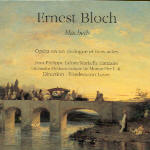Where has this opera been hiding? Well, to answer my own question, it was premiered in Paris in 1910, roamed Naples, Rome, Trieste and Brussels in the ’30s and ’50s, and got to Milan and Berkeley, California in 1960. It deserves wider hearing–it’s a masterpiece: Concise, as dark as the play, lean in its soundstage, dramatic in its vocal lines and all the while remaining what we know as supremely “operatic.” Verdi’s work, by comparison, seems almost a set-piece or interpretation; Bloch’s has the riveting potency of Shakespeare’s original. There are scenes missing–Banquo’s murder is not set to music, and the scene in which Macduff’s Lady and son are murdered is omitted from this recording (I only know it exists through research), but what we get is vivid and never sugar-coated in saccharine harmonies and/or tacky tunes. The language closest to Bloch’s here is Debussy’s in Pelleas, but this is more brutal-sounding. Leitmotifs come and go but seem to identify moods rather than people in particular: Macbeth’s bravery (in battle) and cowardice (elsewhere) have very different sounds. And when Lady Macbeth goes mad, in her sleepwalking scene, we feel as if we’re eavesdropping–she exclaims to herself, and we listen in. The big finales to the first and last acts are big indeed, in contrast to the intimacy of the conversations the characters otherwise engage in. Jean-Philippe Lafont is a rough Macbeth, driven quite mad by power; Markella Hatziano sings Lady Macbeth with rich mezzo tone and an understatement which is chilling, and the remainder of the cast joins in the specialness of the occasion. This performance would be self-recommending even if it weren’t of such high quality, and we are to be grateful to all involved for this live, 1997 concert. The text and notes accompanying the recording are in French only–a pity. But let’s hope the opera is performed somewhere near us very soon.
































